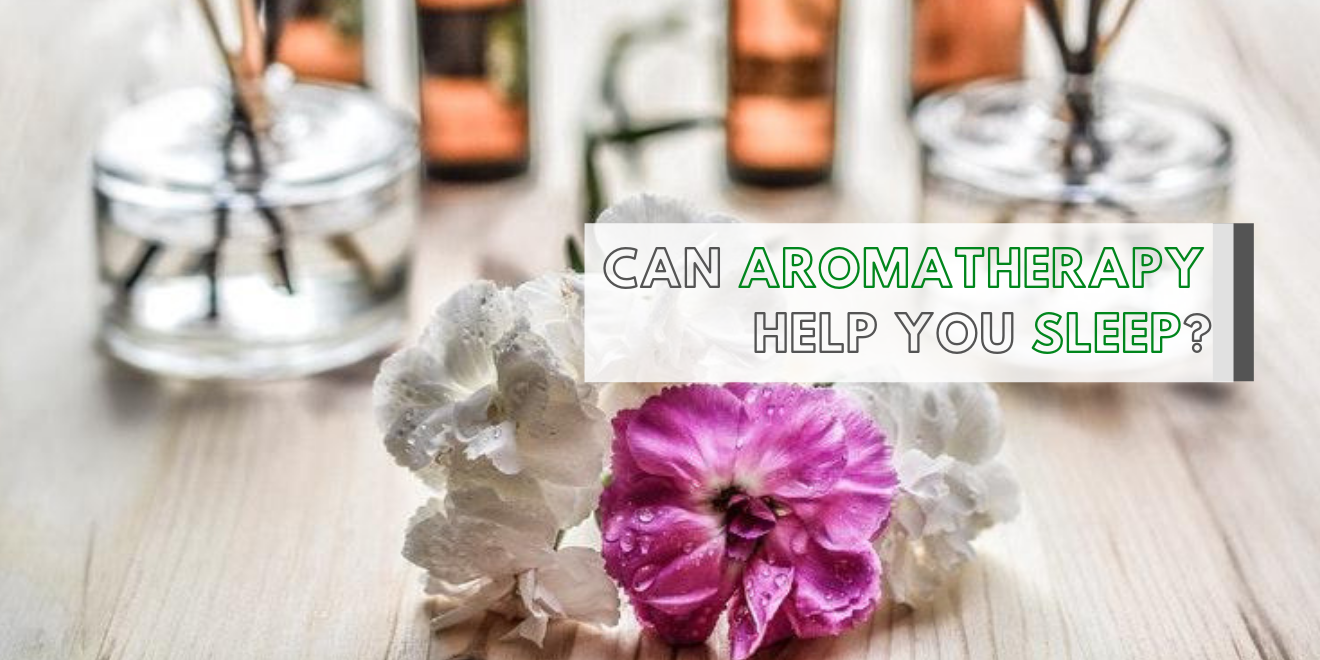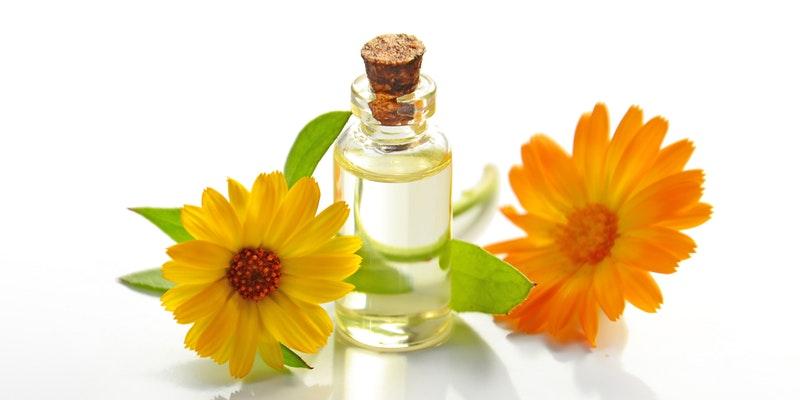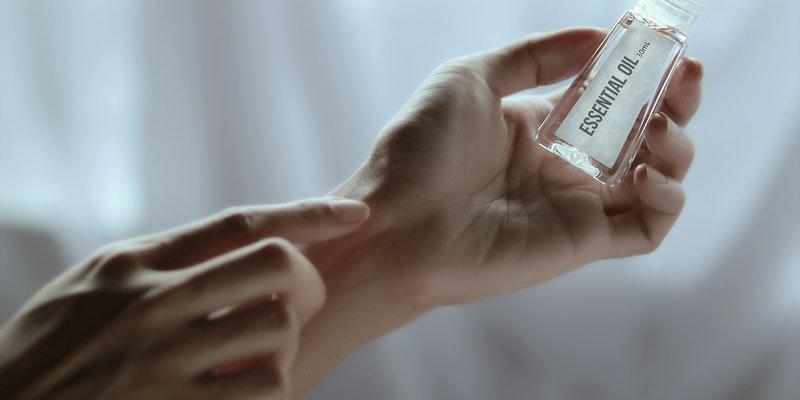Can Aromatherapy Help You Sleep? 4 Essential Oils That Work

If you struggle with tossing and turning every night when you should be sound asleep, you have probably tried a number of remedies to help you drift off. For those that have insomnia or other sleep problems, it can be a frustrating path trying to identify the underlying cause or even find temporary relief.
One option that you may not have tried is essential oils. Extracted from leaves, flowers, and other parts of plants, essential oils carry their own unique scent.
As a means to promote wellness, aromatherapy has been used for thousands of years, utilizing essential oils to soothe and reduce symptoms for many conditions.
Many individuals that suffer from sleep problems have responded well to aromatherapy treatment.
While researchers are still unsure exactly why aromatherapy seems to alleviate sleep problems, a prevailing theory is that when people absorb the essential oils through their skin, that the oils may activate certain chemicals in our brains that are responsible for controlling sleep. Many people claim that using essential oils helps them relax and fall asleep quicker.
[tweet_box design="box_3"]As a means to promote wellness, aromatherapy has been used for thousands of years, utilizing essential oils to soothe and reduce symptoms for many conditions.[/tweet_box]
If you are interested in using essential oils to improve your quality of sleep, here are four scents that are recommended to help you get some more zzzz’s.

Lavender is an all-time favorite essential oil for many ailments, and one of the most frequently used choices for getting better sleep. Lavandula angustifolia (lavender) has been shown in studies to improve the quality of sleep in just a few weeks.
In one particular study in 2015, 159 postpartum women were instructed to mix 10% of pure lavender oil with a carrier oil (in this study it was combined with sesame oil) and place four drops onto a cotton ball. After being placed into a long cylindrical container, the cotton ball imbued the inside of the container from where the participants had to take ten deep breaths.
Finally, the cotton ball accompanied them when sleeping by being placed on their pillows before sleep. The group using the lavender oil reported noticeably improved sleep quality compared to the group using a placebo oil.
Another recent study revealed that patients in an intensive care unit suffering from heart disease were administered 2% lavender oil for inhalation and experienced reduced anxiety and better sleep quality.
Has a grounding, earthy scent and is touted to relieve stress and anxiety by encouraging serotonin production and elevating mood. A natural sedative, cedarwood is often recommended for helping with sleep problems.
An interesting study performed on 178 women, measured their pupil diameter after inhaling cedarwood. The subjects displayed an increased miosis state, which reflects the nervous system activity as seen in the measurement of the pupil diameter, indicating the sedative effects of the oil.
In another study involving cedarwood, the organizers mixed drops of the oil along with several other scents to create a specialized blend to place on participants pillows at night. The subjects slept longer than those that didn’t have the essential oil drops, and they didn’t wake as early in the morning.
A fruity aroma derived from a Southeast Asian tropical tree, ylang-ylang essential oil produces a calming effect. It has been shown to slow the heart rate and reduce blood pressure as well as help the symptoms of depression and insomnia. Combined with lavender and bergamot, the ylang-ylang concoction has been shown to reduce stress and anxiety in study patients.
As far as essential oils for sleep go, bergamot is one of the most recommended. In a published study from 2016, researchers examined the use of an essential oil blend containing bergamot and sandalwood via a personal aromatherapy device to improve sleep quality. From all 65 participants who had access to the device and the oil blend, 92% reported that they would continue to use it after the study ended as they noticed an improvement in their sleep quality.
There are many ways that you can use essential oils to help you sleep. You can also drip a couple of drops on a cotton ball, take a few deep breaths from the container and place the scented cotton balls near your pillow. Another effective way to use these oils is to massage them onto your neck and shoulders to help you unwind,
An excellent remedy, known from ancient times, is having a warm bath before bed with a few drops of essential oils. Using a hot tub with essential oils prepares your body for rest, relax your mind and helps you quickly drift to sleep. A 15-minute soak about an hour before bedtime helps your blood pressure and heart rate decrease, achieving a resting state quicker and promoting your body temperature to drop, enabling a better nights sleep.
Essential oils and hot tubs are indeed a wonderful combination. In recent years, many quality hot tub manufacturers have incorporated aromatherapy into their spa features and have designed essential oil products that are safe to use in a hot tub.
Merging a relaxing soak with essential oils is known to help improve sleep, and can be the perfect remedy for many that have struggled with sleep issues.

Just as some essential oils help promote sleep, some are known to increase alertness, and you should avoid them before bedtime. If you suffer from sleep problems, it’s best not to use these four oils:
Before starting a new regimen with essential oils, it's important to do a patch test on a small area of skin.
Some people may have sensitive skin which may react to different types of essential oils. It is also important to note that essential oils always need to be blended with a carrier oil before applying to your skin.

Also, due to the powerful effects they possess, moderation is key when using them. Because oils are unregulated by law, you need be very careful before you ingest any unless you are sure that they are correctly graded to take internally and that you have discussed with a healthcare professional first.
If you are sick of counting sheep in the middle of the night, try some of these suggested essentials oils and incorporate them into your nightly regimes such as taking a bath or hot tub soak to experience a better quality of sleep. You may find that even the process of preparing your evening aromatherapy treatment brings your body a sense of relaxation and calm, which helps your body prepare for rest.
As scent is often an individual experience, you may need to experiment with several scents to find the one that works best for you. Each of us reacts to fragrances differently, so don’t get discouraged if you need to try a few different oils to find the perfect one to help improve your quality of sleep.
 Scott Bland has been in the leisure industry for nearly 20 years, and as a sales manager, he knows hot tubs inside and out. He also loves writing about consumer goods on the side, so if you want to contact him, you can do so on his LinkedIn.
Scott Bland has been in the leisure industry for nearly 20 years, and as a sales manager, he knows hot tubs inside and out. He also loves writing about consumer goods on the side, so if you want to contact him, you can do so on his LinkedIn.
One option that you may not have tried is essential oils. Extracted from leaves, flowers, and other parts of plants, essential oils carry their own unique scent.
As a means to promote wellness, aromatherapy has been used for thousands of years, utilizing essential oils to soothe and reduce symptoms for many conditions.
Many individuals that suffer from sleep problems have responded well to aromatherapy treatment.
While researchers are still unsure exactly why aromatherapy seems to alleviate sleep problems, a prevailing theory is that when people absorb the essential oils through their skin, that the oils may activate certain chemicals in our brains that are responsible for controlling sleep. Many people claim that using essential oils helps them relax and fall asleep quicker.
[tweet_box design="box_3"]As a means to promote wellness, aromatherapy has been used for thousands of years, utilizing essential oils to soothe and reduce symptoms for many conditions.[/tweet_box]
If you are interested in using essential oils to improve your quality of sleep, here are four scents that are recommended to help you get some more zzzz’s.
Lavender

Lavender is an all-time favorite essential oil for many ailments, and one of the most frequently used choices for getting better sleep. Lavandula angustifolia (lavender) has been shown in studies to improve the quality of sleep in just a few weeks.
In one particular study in 2015, 159 postpartum women were instructed to mix 10% of pure lavender oil with a carrier oil (in this study it was combined with sesame oil) and place four drops onto a cotton ball. After being placed into a long cylindrical container, the cotton ball imbued the inside of the container from where the participants had to take ten deep breaths.
Finally, the cotton ball accompanied them when sleeping by being placed on their pillows before sleep. The group using the lavender oil reported noticeably improved sleep quality compared to the group using a placebo oil.
Another recent study revealed that patients in an intensive care unit suffering from heart disease were administered 2% lavender oil for inhalation and experienced reduced anxiety and better sleep quality.
Cedarwood
Has a grounding, earthy scent and is touted to relieve stress and anxiety by encouraging serotonin production and elevating mood. A natural sedative, cedarwood is often recommended for helping with sleep problems.
An interesting study performed on 178 women, measured their pupil diameter after inhaling cedarwood. The subjects displayed an increased miosis state, which reflects the nervous system activity as seen in the measurement of the pupil diameter, indicating the sedative effects of the oil.
In another study involving cedarwood, the organizers mixed drops of the oil along with several other scents to create a specialized blend to place on participants pillows at night. The subjects slept longer than those that didn’t have the essential oil drops, and they didn’t wake as early in the morning.
Ylang Ylang
A fruity aroma derived from a Southeast Asian tropical tree, ylang-ylang essential oil produces a calming effect. It has been shown to slow the heart rate and reduce blood pressure as well as help the symptoms of depression and insomnia. Combined with lavender and bergamot, the ylang-ylang concoction has been shown to reduce stress and anxiety in study patients.
Bergamot
As far as essential oils for sleep go, bergamot is one of the most recommended. In a published study from 2016, researchers examined the use of an essential oil blend containing bergamot and sandalwood via a personal aromatherapy device to improve sleep quality. From all 65 participants who had access to the device and the oil blend, 92% reported that they would continue to use it after the study ended as they noticed an improvement in their sleep quality.
Using Essential Oils for Sleep
There are many ways that you can use essential oils to help you sleep. You can also drip a couple of drops on a cotton ball, take a few deep breaths from the container and place the scented cotton balls near your pillow. Another effective way to use these oils is to massage them onto your neck and shoulders to help you unwind,
An excellent remedy, known from ancient times, is having a warm bath before bed with a few drops of essential oils. Using a hot tub with essential oils prepares your body for rest, relax your mind and helps you quickly drift to sleep. A 15-minute soak about an hour before bedtime helps your blood pressure and heart rate decrease, achieving a resting state quicker and promoting your body temperature to drop, enabling a better nights sleep.
Essential oils and hot tubs are indeed a wonderful combination. In recent years, many quality hot tub manufacturers have incorporated aromatherapy into their spa features and have designed essential oil products that are safe to use in a hot tub.
Merging a relaxing soak with essential oils is known to help improve sleep, and can be the perfect remedy for many that have struggled with sleep issues.
Which Oils to Avoid?

Just as some essential oils help promote sleep, some are known to increase alertness, and you should avoid them before bedtime. If you suffer from sleep problems, it’s best not to use these four oils:
- Sandalwood: Elevated pulse and blood pressure
- Vetiver: Reduces deep slow wave sleep, and increases wakefulness
- Sage: Increases alertness and cognitive function
- Petitgrain: Increases alertness and attentiveness
Do Essential Oils Have Side Effects?
Before starting a new regimen with essential oils, it's important to do a patch test on a small area of skin.
Some people may have sensitive skin which may react to different types of essential oils. It is also important to note that essential oils always need to be blended with a carrier oil before applying to your skin.

Also, due to the powerful effects they possess, moderation is key when using them. Because oils are unregulated by law, you need be very careful before you ingest any unless you are sure that they are correctly graded to take internally and that you have discussed with a healthcare professional first.
If you are sick of counting sheep in the middle of the night, try some of these suggested essentials oils and incorporate them into your nightly regimes such as taking a bath or hot tub soak to experience a better quality of sleep. You may find that even the process of preparing your evening aromatherapy treatment brings your body a sense of relaxation and calm, which helps your body prepare for rest.
As scent is often an individual experience, you may need to experiment with several scents to find the one that works best for you. Each of us reacts to fragrances differently, so don’t get discouraged if you need to try a few different oils to find the perfect one to help improve your quality of sleep.
About the Author: Scott Bland
 Scott Bland has been in the leisure industry for nearly 20 years, and as a sales manager, he knows hot tubs inside and out. He also loves writing about consumer goods on the side, so if you want to contact him, you can do so on his LinkedIn.
Scott Bland has been in the leisure industry for nearly 20 years, and as a sales manager, he knows hot tubs inside and out. He also loves writing about consumer goods on the side, so if you want to contact him, you can do so on his LinkedIn.



































































































